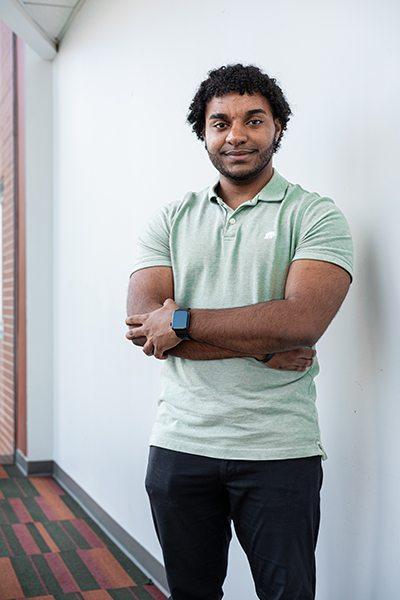Amplifying Voices Through Law
Josh Ventura, Class of 2026

Josh Ventura grew up in North Philadelphia, where he witnessed how communities wrestle with injustice. He spent nearly a decade as a music entrepreneur, co-founding a music company while still in high school. The company owned and managed music studios and creative spaces across Philadelphia, Tampa, Houston and Las Vegas. “Music helped me navigate my environment, shaped my path and gave me a voice,” Ventura said. “I wanted to create a similar outlet for others.”
Over time, Ventura came to see that while entrepreneurship provided opportunities, it couldn’t fully address the systemic challenges he saw in his community. This insight pushed him toward law school. “I felt limited in my ability to make change through entrepreneurship alone. Law offered me another tool to make a difference.”
Staying Close to Purpose
When it came time to choose a law school, Ventura knew proximity mattered. He wanted to remain near his family, his business, his community and the city that had grounded him. “I made a rule for myself from day one: Stay close to the things and people I care about,” he said. Drexel University’s experiential learning model sealed his decision. “Here, I’m constantly reminded of why I started this journey.”
At first, Ventura pictured himself becoming an entertainment lawyer, a natural extension of his entrepreneurial background. This vision shifted as soon as he began working directly with marginalized individuals and witnessing the impact of his work. His 1L summer internship at the Defender Association of Philadelphia became a turning point. “Every day, I felt like the work I did mattered,” he recalled. “I was making a difference, advocating for people from communities like those I came from navigating a system stacked against them—and it confirmed this is what I came to law school to do.”
He went on to complete a co-op at the Philadelphia Federal Public Defender’s Office, working as a law clerk and as a judicial intern for Judge Michael C. Lambert. Each experience, he said, showed him a different dimension of representation. “Those roles gave me confidence that I could not only understand the law but use it to help people find their footing.”
Expanding His Vision
Ventura’s studies during his 2L year broadened his direction beyond criminal defense. Courses in constitutional law and personal reflection led him toward civil rights. “I realized the lawyers who had inspired me most were civil rights lawyers,” he said. “They were the ones driving systemic change.”
This recognition guided him toward Drexel Kline Law’s clinics, additional fieldwork and eventually the Carl “Tobey” Oxholm III Summer Fellowship with the City of Philadelphia Law Department. There, Ventura worked in the Civil Rights Unit, where he drafted motions, reviewed discovery materials and assisted in litigation of civil rights matters in state and federal courts. “I brought dedication and accountability to my work and was trusted with high-impact litigation projects,” he said, referring to preparing a motion to dismiss in an excessive force case. “That experience strengthened my writing and showed me how much weight my work can carry.”
The fellowship also reinforced a lesson that has stayed with him: The law is rarely straightforward. “There’s always more to the story,” Ventura observed. “Allegations might be made, but the full picture only comes out through investigation, discovery and litigation. This process taught me never to take anything at face value.”
Toward a Civil Rights Career
Ventura’s journey continues to center on amplifying voices. His fellowship provided insight into government practice and confirmed his commitment to civil rights litigation. As a 3L, he is a clinical student enrolled in Drexel’s Criminal Litigation Clinic with the Defender Association of Philadelphia, where he serves as a certified legal intern representing indigent clients in felony preliminary hearings and trials in municipal court. Looking ahead, he envisions a career that may span advocacy, policy or public service. “I know the type of lawyer I want to be. For me, it’s about ensuring people feel recognized and represented.”
To other students considering similar paths, he offers straightforward advice: “Meet people. Ask questions. Every conversation opens a door.”
For Ventura, the thread connecting music and law has always been clear. “Both are about creating spaces for stories to be heard,” he reflected. Now, beyond the studio, his stage is the law.
Co-op Externships
Drexel Kline Law’s co-op program is one way to complete the law school’s experiential learning requirement; clinical experiences are another. Co-op allows students to do meaningful work for academic credit at a law firm, corporate office, government agency, court or public law organization—for a semester or an entire academic year, part-time or full-time.
Latin American Law Students Association (LALSA)
Student organizations are another way Drexel Kline Law students connect with each other and the Philadelphia community. As a 2L, Ventura was president of LALSA and helped organize pro bono service and several events during the academic year.